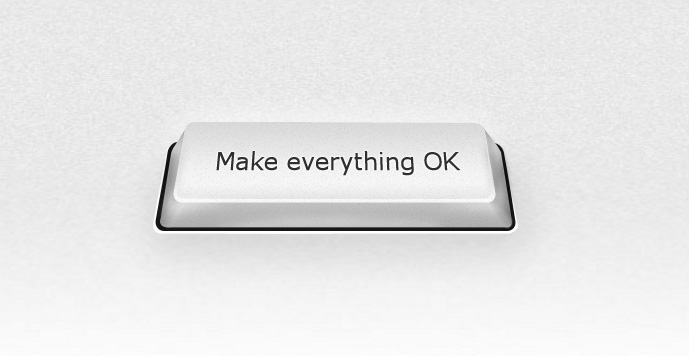Several months ago, a Facebook friend shared with me this “Magic Button”. Use it RIGHT NOW by exerting less effort than Dorothy did; just CLICK ON IT TWICE!!! Once to navigate beyond this page, and again once you’re on the Magical Site. Just a few seconds, and you’ll be beyond the rainbow:
OK, now that you’ve been endowed with otherworldly wisdom, GET BACK HERE.
Author Steve Chandler reminds his students and clients that we don’t react to what’s happening in the world—we react to our thoughts about what’s happening.
When the Red Sox are playing the Yankees and Mike Aviles hits in two runs in the eighth inning to pull the Sox ahead, Sox fans are elated and Yankees fans are not feeling “okay”. Objectively, the event itself is neutral—a player gets a hit and two runs are scored. But how we each feel about the event depends on our thoughts about what it means.
A dark room is just a dark room. Only our thoughts about it give the darkness significance. As a little boy, I would never look into a mirror in a dark room out of terror about what monsters, ghosts, or demons I might see there looking back at me. When I became a little older, my attitude shifted; I began to play a game in the unlit rooms of my home, trying to learn the locations of furniture and other objects so that I wouldn’t need to turn on the lights. (I have to admit that I still play this game sometimes, and it gives me an ever-greater appreciation for people without their eyesight—like my friend Jim—who don’t have a choice in the matter.) For a majority of skeptical adults, a dark room is just an inconvenience that requires a light switch.
When a client or prospective client says “no”, it’s just someone exercising a choice. That single reaction (or several of them in a day) might result in you feeling rejected, frustrated, or depressed; or in you thinking that you are “no good at” selling, enrolling, or engaging new clients; or that “no one wants” what you have to offer.
These feelings, however, come not from the act of someone saying “no” to you, but from what we think “no” means.
When you’re feeling low because your thoughts are clouding your perspective, you’re left with two choices of your own: Press the button and make everything okay, or check your settings of perception of objective reality.
Try this experiment: Spend your next week saying “no” to as many offers as you can—from anyone:
“Do you want to go to the movies?” “No.”
“Would you like a sandwich?” “No”
See if you can’t come to see “no” as a simple choice. Then, make some calls with the perspective that “no” is as fine a choice as is “yes”. Outcome dependency is a subjective setting you are free to check and change.
If that doesn’t work, contact me, and we’ll talk about your perceptions.
In the meantime, PRESS THE BUTTON, and keep REACHING…
![]()



